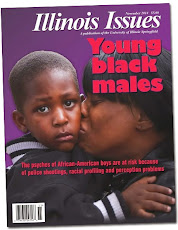If Gov. Rod Blagojevich’s revenue idea to create a gross receipts tax fails to get legislative approval this spring (or summer), the governor is willing to consider other revenue sources, according to John Filan, Blagojevich’s former budget director and current chief operating officer.
“He won’t support an income and sales tax increase, but there are other aspects of the budget, other revenues he’d take a look at,” Filan said Monday after a budget-related conference in Springfield. But the administration is determined to keep the gross receipts tax as its primary revenue source, with some flexibility in tweaking it. “We think the gross receipts tax is the kind of tax that can generate that kind of money without disrupting large parts of the economy with smaller tax bases like an income tax or, especially, a sales tax does.”
He and budget director Ginger Ostro joined a panel of policy experts on taxes, education funding and business at “A Budget on the Brink” conference at the Springfield Hilton Monday. (Find more information about “A Budget on the Brink” here.) There was a lot of back-and-forth and repeated allegations of people citing facts based on assumptions rather than on transparent numbers. But the panels also posed a few good questions: 1) Does the state truly need more money to spend? If so, then how can the state fairly restructure its tax code? And 2) If the state needs to control spending as business groups advise, then what can the state and state agencies cut out?
Blagojevich’s $10 billion investment in education over four years wouldn’t fly without a revenue source as big as the $7 billion expected from GRT. Because the governor already ruled out increases in income or sales taxes proposed in HB 750 (see our March 20 blog), what else is on the table that would generate as much revenue as the GRT?
- Leasing the Illinois Lottery: at least $10 billion, but the governor already earmarked that for pension funding
- Leasing the Illinois Tollway: anywhere from $1 billion to more than $20 billion, but that hasn’t gone anywhere this session
- Selling a larger chunk of the state’s student loan portfolio: a $4 billion asset, but legislators urge that money only be used for higher education
- Opening four new Chicago-area casinos with expanded gaming statewide: between $2 billion and $3.5 billion a year. HB 480, proposed by Rep. Lou Lang of Skokie, wasn’t mentioned by the governor and is stalled in negotiations
- A combination of all of the above
And what about the near-universal health care plan that would cost about $2.1 billion annually by the time it’s fully implementation in 2010? The governor could still secure the $1.1 billion generated by a payroll tax on businesses that don’t offer comprehensive health benefits. But he’d also need some other form of revenue or federal funds.





No comments:
Post a Comment